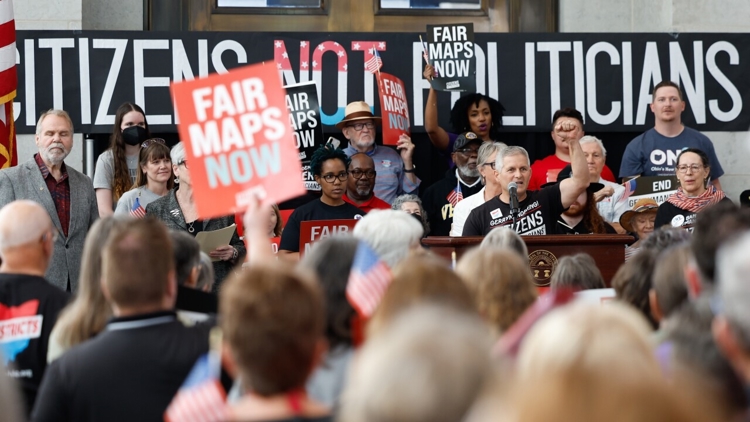Advocates pushing an anti-gerrymandering amendment in Ohio to remove politicians from mapmaking in favor of a citizen commission said the state’s ballot board should be forced to start over on summary language for the November proposal.
Attorneys said the proposed amendment would ban partisan gerrymandering "by setting forth robust redistricting criteria to ensure fair maps, selection standards to ensure the new commission’s impartiality and accountability, and transparency measures to ensure public information and participation," according to a merit brief filed Thursday.
But they say the summary language written by Ohio Secretary of State Frank LaRose and adopted by a majority of the Ohio Ballot Board on Aug. 16 "would have voters believe exactly the opposite."
The Ohio Ballot Board decides what language voters will see on their ballots when they go to vote, but that summary language does not change what the proposed amendment would actually do. In a 3-2 vote, the Ohio Ballot Board approved summary language that supporters of the anti-gerrymandering amendment say is intentionally misleading and biased against the amendment. They have filed a lawsuit with the Ohio Supreme Court opposing the summary language.
The merit brief is part of that lawsuit filed by Citizens Not Politicians, the group who has led the charge for the anti-gerrymandering amendment. The lawsuit asks the state's highest court to order changes to the summary language made by the ballot board, chaired by Ohio Secretary of State LaRose.
The proposed amendment signed by more than 535,000 verified Ohio voters would replace the current Ohio Redistricting Commission made up of seven politicians, including LaRose, with a 15-member citizens commission made up of Republicans, Democrats, and independents.
Citizens Not Politicians Attorney Don McTigue pointed to a change made by state Sen. Theresa Gavarone, R-Bowling Green, during the ballot board's meeting, in which she changed the word "manipulate" to "gerrymander" when describing the methods of redrawing congressional and statehouse district lines within the amendment.
"Earlier this year, Attorney General Dave Yost certified that the Amendment's summary was 'fair and truthful,'" McTigue wrote. "That summary states, consistent with the amendment's plain text, that the amendment would ‘ban partisan gerrymandering.'"
The brief emphasizes what the original complaint filed on Aug. 19 asserted, which is that the opinion of whether or not the proposed amendment "offers better policy than the existing system" should be left up to the voters in November.
"The Ballot Board's job is to provide ballot language that gives voters the facts so that they can make up their own minds," the brief states.
That language should follow constitutional rules dictating the language and the title, something the LaRose language doesn't do, according to Citizens Not Politicians.
The Ohio Constitution states ballot language "shall properly identify the substance of the proposal to be voted upon," and the language "shall not be held invalid unless it is such as to mislead, deceive or defraud the voters."
The Ohio Revised Code says the secretary of state or the ballot board is required to "give a true and impartial statement of the measures in such language that the ballot title shall not be likely to create prejudice for or against the measure."
The title of the redistricting amendment, as approved by the board majority, is "to create an appointed redistricting commission not elected by or subject to removal by the voters of the state."
"The Ballot Board's attempt to put a thumb on the scale against the amendment is a thumb in the eye of Ohioans who expect their representatives on the Board to carry out their mandatory duties impartially," McTigue wrote.
The Ohio Attorney General has filed an answer to the complaint, but the filing has already received criticism from the Democratic members of the ballot board, who say they were not consulted on the legal document, nor have they been given outside counsel to speak on their behalf, despite the fact that the the two Democrats, state Sen. Paula Hicks-Hudson and state Rep. Terrence Upchurch, voted against the ballot board language.
Hicks-Hudson and Upchurch ended up filing a brief themselves on Wednesday night, in which they did not fight arguments that the ballot board "as a whole violated its constitutional duty," and said the "chosen ballot title is inaccurate, biased, argumentative and misrepresents the proposed amendment’s procedures for removing commissioners who fail to comply with their duties."
McTigue said the court "has never hesitated to strictly enforce the legal requirements for the text that appears on the ballot, in recognition of Ohioans' century-old right to amend their constitution and laws through direct democracy."
"The court should do the same here, by directing (the ballot board) to start over and adopt ballot language and a ballot title that are consistent with their clear legal duties."
The Ohio Supreme Court was asked just last year to make changes to a ballot board-approved summary, in that case for the reproductive rights constitutional amendment that would eventually pass with 57% of the vote.
The coalition that sued took issue with ballot language that used the phrases "unborn child" and "reproductive medical treatment," along with using the phrase "the citizens of the State of Ohio" rather than just "the State of Ohio" when speaking of the prohibitions against "indirectly burdening, penalizing or prohibiting abortion."
In a similar way to the redistricting amendment author's arguments that the LaRose language could mislead voters as to the intentions of the proposed amendment, the lawsuit against the reproductive rights amendment summary said it could mislead voters about the rights the amendment created, the restrictions in the amendment, discretion when it comes to fetal viability and state regulation of the amendment.
The Ohio Supreme Court said they agreed "that the ballot language approved by the ballot board misleads the average voter about whose actions the amendment restricts."
"But the ballot language is not defective in any other respect," the court wrote.
The court asked the ballot board only to change the phrase "citizens of the State of Ohio" to "State of Ohio," and approved the rest.
Justice Michael O'Donnelly wrote in his concurring opinion that it was "unfortunate that advocacy seems to have infiltrated a process that is meant to be objective and neutral."



